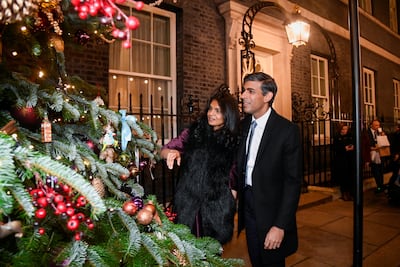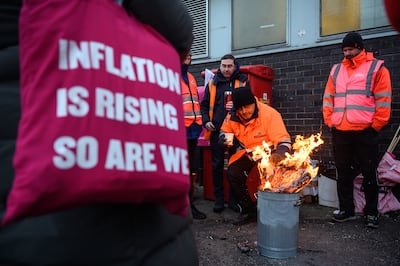When winter tidings are grim in British politics, a prime minister will eye the countdown to Christmas as eagerly as a child anticipates a chocolate advent calendar.
When the holiday arrives in Downing Street next week, Rishi Sunak will take solace in the traditional fortnight of political silence that will descend.
But ringing in his ears will be the cries from the picket lines from nurses, postal workers, train drivers and immigration staff demanding more pay, with Britain on the precipice of a general strike.
Mr Sunak will take some heart that he has survived longer than the 50 days of his predecessor Liz Truss, but the new year will raise questions over the wave of strike action that could jeopardise his own political survival.
Tottering economy
Resolving the financial mess inherited from Ms Truss’s curtailed leadership was a challenge Mr Sunak competently surmounted in last month’s autumn statement.
But the strict financial parameters that steadied Britain’s tottering economy are being challenged by the unions, presenting Mr Sunak with his first real leadership test.
Affable, gracious and witty, the first British-Asian leader appears a gentle soul. We will soon find out if he possesses the inner steel to resist the demands of Britain’s nurses, held several planes higher in public esteem than the political class.
That has been enhanced by the National Health Service’s achievements during the Covid-19 pandemic and a public awareness that nurses are poorly paid relative to their workload and the emotional stresses that come with it.

Mr Sunak, 42, has yet to demonstrate that he has a plan, but government insiders believe the demand for a 19 per cent pay rise might soon appear unreasonable.
“The problem is that nurses are seen as angels and instantly get sympathy from the public, but they have to moderate their demands,” a Conservative source said. “It's very hard not to feel sympathy for them, but any pay settlement has got to be affordable and reasonable.”
Mr Sunak’s political skills will need to be sharp if the strike endures and patients suffer while hospital waiting lists get longer.
For now, political insiders say, his position is to observe, keeping a lofty prime-ministerial distance between the picket line and the seat of British power.
Inflation peril
With autumn’s financial overhaul addressing the £50 billion ($60.9 billion) shortfall in finances somewhat, there is very little room to concede.
There is also a question of playing patience to see if the economy can produce some positives and inflation is already inching away from its double-digit high.
Downing Street believes that could lead to more realistic wage demands. Mr Sunak, a former chancellor, knows that if he concedes on pay, that could unleash other demands, further fuelling inflation and crippling the economy.
Political decisions have again become a high-wire act, said Dr Alan Mendoza, of the centre-right Henry Jackson think tank.

“This is a very tough situation, given that the Prime Minister is trying to maintain financial stability, while fully aware that giving in to the demands of the strikers will place a burden not simply on the economy but on individual families struggling to deal with the cost-of-living rises,” he said.
“The reality is that everyone recognises there must be a deal because everyone will need a pay rise. But it's at what level can we do this and surely it’s in everyone's interests that we get inflation under control as quickly as possible?”
The graft to prevent rising inflation underpins all Mr Sunak’s economic management and any hope that he might have of winning the next general election.
Indeed, that may well reinforce his resilience in refusing to yield to the strikers’ demands. If he loses against inflation, he loses office.
“The reality is that we need to hold firm and say, ‘we're all in this together’,” said another Conservative insider. “The nurses' 19 per cent demand is well off where the public is on this. Rishi is right to hold his ground, there is room for a sensible deal but we can't sacrifice inflation for what trade unions feel their members deserve.”
Clever policy?
Other Tories believe a clever policy of conceding to one side and remaining robust to the other will break the strikers’ collective unity.
The rail unions have been picketing for years, in part over pay but also against having trains without guards. Public sympathy is low, especially when action involves Christmas disruption.
Once a citadel of the British high street, the Post Office is being subsumed by the technological age and the galaxy of delivery drivers.
UK strikes – in pictures
Border Force staff are trickier, especially at a time of high immigration, yet they are an essential government service, therefore soldiers are being trained to do their job — for much less pay, it is pointed out.
Similarly, the army is stepping in to drive ambulances and, sadly, the population has become used to having to wait for hours for assistance.
Which leaves the nurses and their pay request, which would cost the Treasury an estimated further £10 billion ($12.19 billion).
However, there is an argument that generously increasing their pay may induce a virtuous circle, retaining and attracting staff that will help bring down the list of those awaiting operations.
Holding nerve
The public sector wage bill already accounts for almost a quarter of government expenditure and every 1 per cent increase in public sector pay would increase state spending by £2 billion.
The hope would appear to be that after months of protest action from nurses and others, momentum, as well as earnings, are lost from the mounting number of strike days.
The coming weeks will “be a test of his nerve and to a certain extent a test of the prime minister’s authority”, said former minister David Jones.
“At the moment he is playing it correctly,” the MP for Clwyd West said. “For the nurses there will be negotiations, but it's a question of seeing how that develops as it is still early days. There can be a resolution but while inflation is dropping, we don’t want it stoked up again with high pay settlements that ultimately will devalue any settlement that they get.”
Shut for Christmas
For now, Mr Sunak is relying on an independent pay review body’s offer that recommends an annual £1,400 pay increase for nurses. He will also look to Scotland where nurses have accepted a pay settlement of 7.5 per cent and cancelled strikes.
The Conservative leader knows that for now he has to keep his nerve and in a few days he can shut up shop for two weeks and see what appetite there is for public sector strikes next year.
Nurses strike in the UK - in pictures
In his most recent interview the Prime Minister insisted union bosses should not be fooled by his gentle demeanour.
“I am not afraid to be tough to achieve what I think is right for the country, people shouldn’t mistake the politeness for that,” he told The Spectator magazine. This apparent robustness was enhanced with the threat of “tough new strike laws”.
The problem is that after the pandemic, energy crisis and financial instability, the public sector is in a fragile state. If it crumbles, a general election could well follow and Mr Sunak’s tenure in No 10 may prove almost as fleeting as his predecessor’s.




















